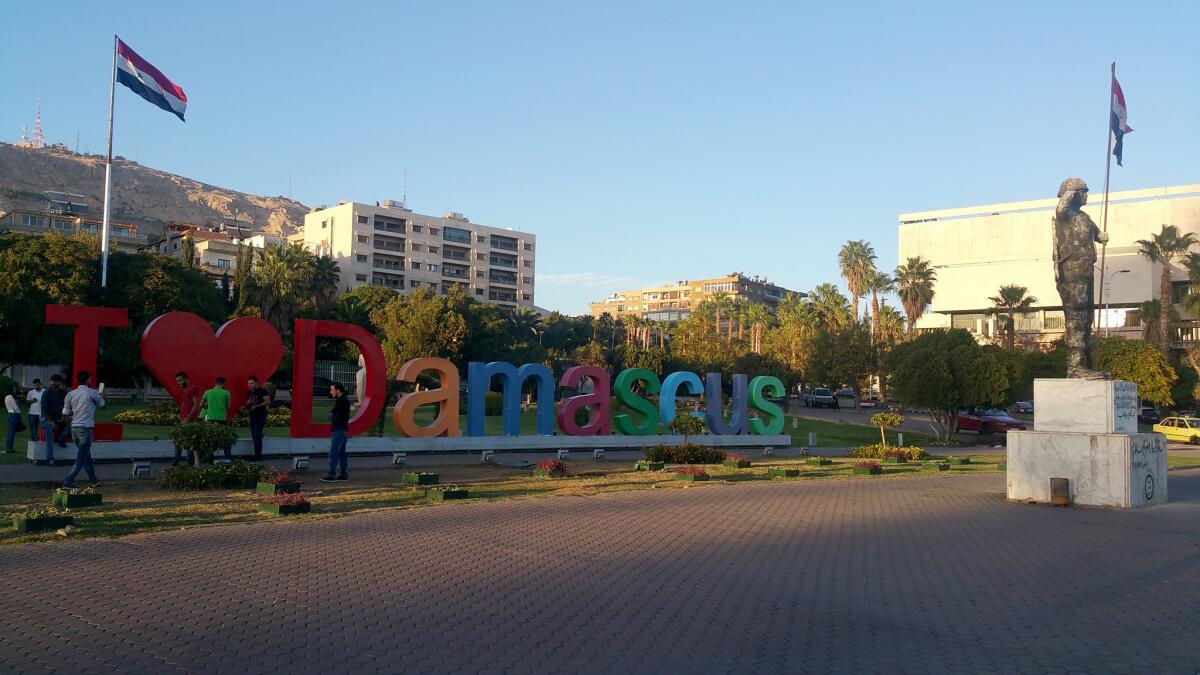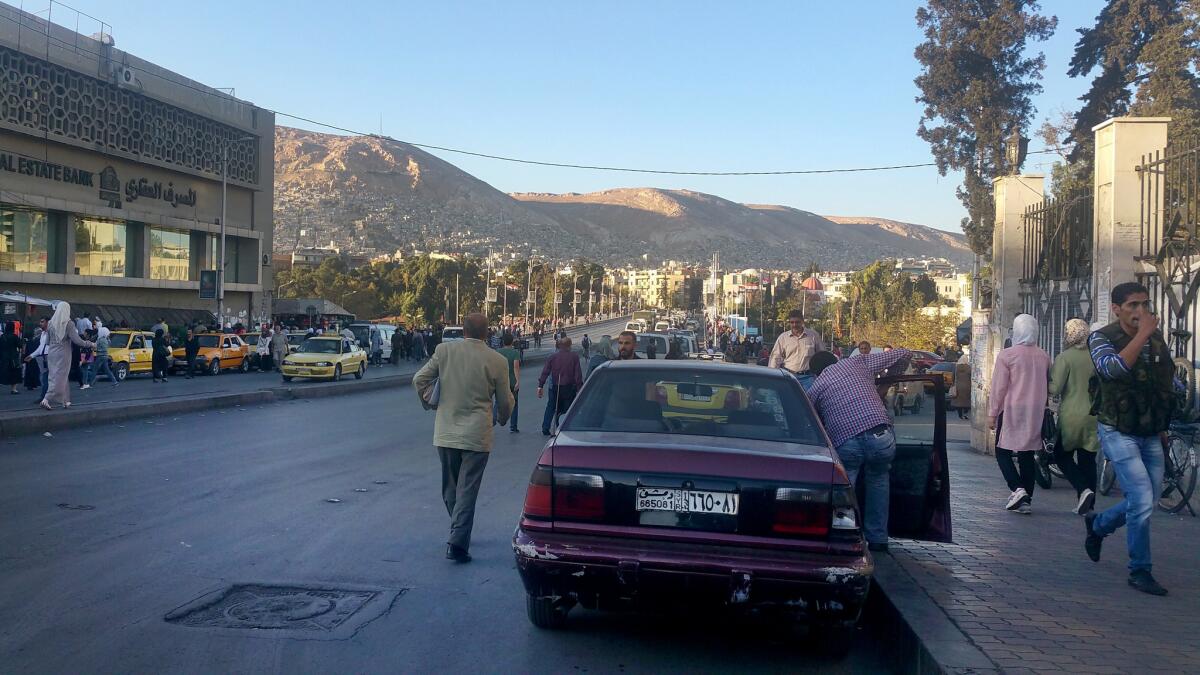In Syria’s capital, the civil war suddenly seems far away

- Share via
Reporting from Damascus, Syria — The guns have been silenced; that is the first change a returning visitor notices while driving around Syria’s capital.
In years past, the booms of artillery, mortars and rockets exchanged between the forces of Syrian President Bashar Assad and the rebels arrayed against his rule provided an ominous backbeat to city life. (“That one is outgoing,” residents would confidently say to flinching visitors.)
In their stead, all that could be heard in the Christian quarter of Bab Touma on Saturday night was the chatter of an early Halloween celebration. It was another sign of a resurgent Damascus that appears to have shuffled off the war weariness prevalent before the country’s Russian-backed military began making gains against rebel groups over the last year.
Women in high heels teetered on the narrow, decrepit sidewalks.
They joined gaggles of young people congregating in front of a popular shawarma joint, strategically nestled among a newly opened strip of bars on Mustaqim Street.
Inside the smallest of them, a bar called Abu George, the decor features kitschy lamps, “antique” baubles and posters of bikini-clad women. The walls are covered with thousands of scribbles, lurching from the joyful (“I’m so happy to be here. Wish I could stay forever in Damascus!”) to the defiant (“Only the God [sic] can judge me.”)
The mustachioed bartender, Abu Issam, held court near a tiny counter.
ONE YEAR AGO: In Damascus, Syrians express a surprising level of optimism »
Even though it was a work night (Sunday is the beginning of the workweek in Syria), there was barely space to stand.
Across the street, at the Tiki Bar, one Halloween-themed party was in full swing; while a pirate danced with a milkmaid, flat-screens looped a video of skeletons dancing a can-can.
Elsewhere, people took selfies and loafed around a large “I love Damascus” sign — in English -- as cars and buses careened into the Umayyad roundabout. One couple took a seat within the folds of the “m” before snapping a picture. The sign, a nearby policeman says, was installed a little over a month ago.
“What you’re seeing now is the result of six years of stress,” said Khaled Mahjoob, a Damascus-based businessman who is said to be close to the Assad family and is a self-described civil activist, referring to the pent-up frolicking. “People will go back to living their lives even with the minimum amount of security.”
That sense of security, Mahjoob and others say, has come largely due to recent government advances in areas around the capital.
Ali Haidar, Syrian minister for reconciliation, ticked off the names of four Damascus suburbs formerly held by rebels, who used them to regularly lob mortar shells and rockets into government-held areas. “They’ve all reconciled,” he said.
By that, he meant that the rebels had accepted an amnesty in return for laying down their arms and reintegrating into government institutions.
“The aim was to stop these areas from being a battlefield, and for them to become islands of peace and stability. It’s a major difference between today and two months ago,” he said.
Critics insist that “reconciliation” is a continuation of “surrender or starve” tactics, and that those who reconcile continue to be pursued by the government.
For those who have not run afoul of Assad, life appears better, at least for the time being.

In one major sign of renewed vitality, business owners have returned and reopened factories and companies destroyed or looted in the war.
“I’ve bought new equipment and will start production soon,” said Anton Bathanjani, an olive-oil merchant. He showed a visiting reporter dozens of messages from business owners on a WhatsApp group for foodstuffs manufacturers.
“We have more than 56 companies in this group alone,” he boasted, adding that in Tel Kurdi, an area recently taken by the government, troops had allowed merchants to restart their businesses.
Yet signs of the conflict, which has devastated the country and killed hundreds of thousands, linger.
Another businessman, who asked not to be identified for security reasons, spoke of a fear of rising corruption and emboldened warlords, especially near areas still out of government control.
Checkpoints remain sprinkled in many neighborhoods. Electricity is still prone to daily cuts, although it has improved. Cars jostle their way into long lines at gas stations.
Even in Bab Touma, the Christian quarter, young men toting AK-47s could be seen among the throng of revelers.
International sanctions levied on the Syrian government also bedevil attempts to restart the country’s economy.
A pharmacist, Rouba Mirza, complained bitterly about the lack of basic medicines, including painkillers and children’s antibiotics – cheap and freely available before the war.
“We have an 80% loss of production. We don’t lack the capacity to manufacture, but we don’t have the raw materials,” said Mirza, who spoke at a two-day workshop organized by the British Syrian Society.
“If you spend a day in a clinic here,” he added, “it’s a tragedy.”
Bulos is a special correspondent.
ALSO
Syrian rebels withdraw from Damascus suburb, ending long-running siege
U.S. and Russian warplanes jostle for space over battlefields in Syria
More to Read
Sign up for Essential California
The most important California stories and recommendations in your inbox every morning.
You may occasionally receive promotional content from the Los Angeles Times.










